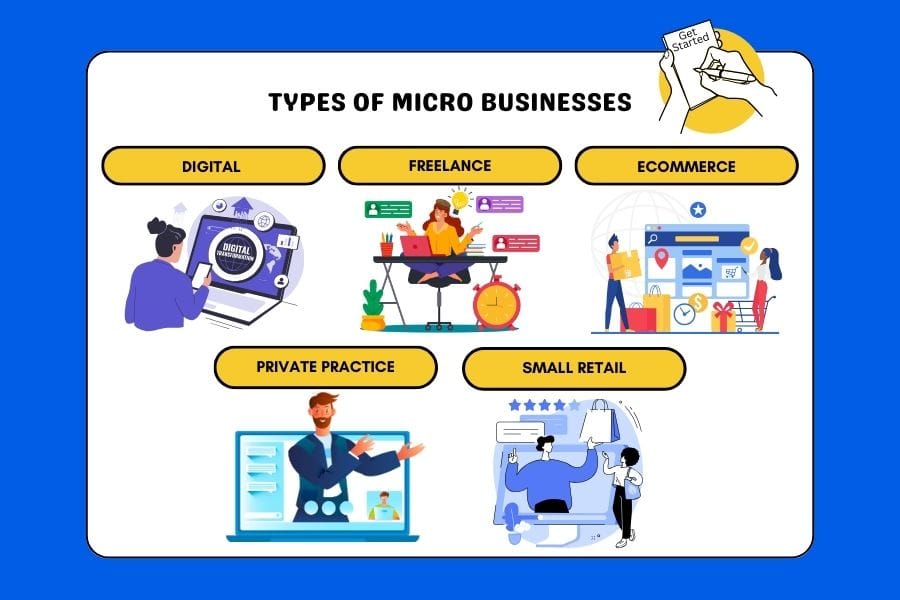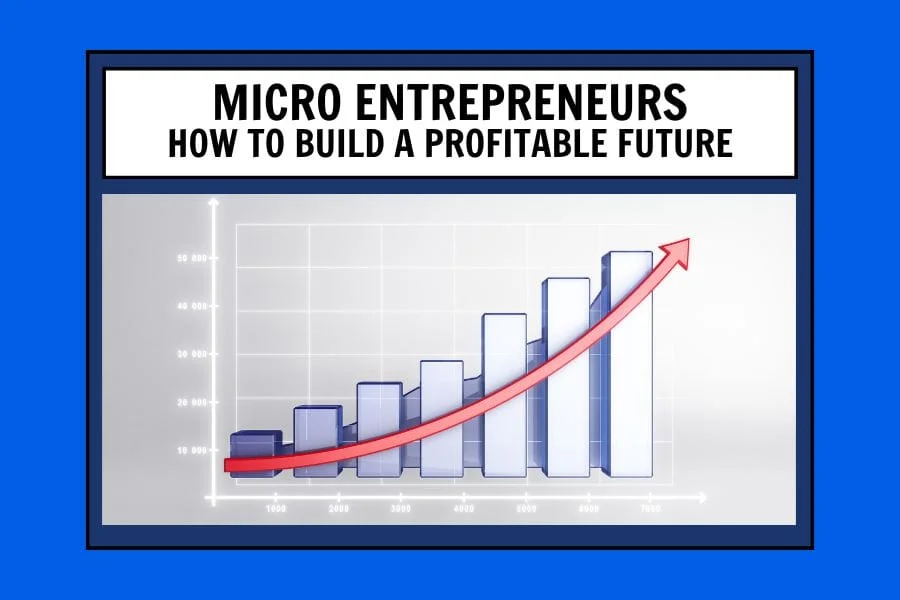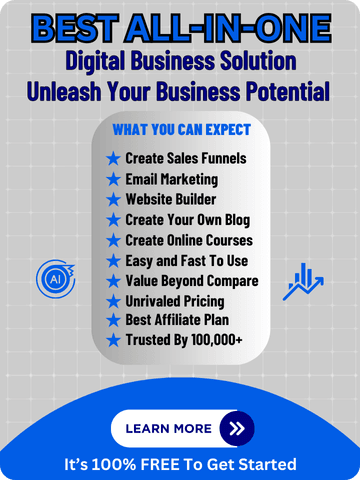Micro entrepreneurs: Discover how to build a profitable future with expert tips, actionable strategies, and tools to grow and thrive in 2025 and beyond.
Introduction
As a micro entrepreneur, you know the challenges of building something meaningful from the ground up. Whether you’re launching a side hustle, freelancing your expertise, or starting a small online business, the journey is both exciting and daunting. You’re likely grappling with questions like, “How do I stand out?” or “What tools do I need to thrive in this fast-paced digital world?” The good news is, you’re not alone, and this guide is here to equip you with the strategies, tools, and insights you need to shape a profitable future.
In this post, we’ll explore everything from defining what it means to be a micro entrepreneur to identifying the best business ideas for 2025. You’ll learn step-by-step how to launch, manage, and grow your micro business, while overcoming common hurdles like financial constraints and market competition. Whether you’re looking to scale your venture or simply get started, you’ll find actionable advice and proven techniques to help you thrive in today’s competitive landscape. Ready to dive in and take control of your future? Let’s get started!
What is a Micro Entrepreneur?

As a micro entrepreneur, you’re someone who runs a small-scale business, often independently or with minimal employees. Unlike traditional entrepreneurs managing large operations, you focus on simplicity, creativity, and efficiency to achieve your goals. Your venture may involve anything from freelance services to selling products online, but the common thread is your ability to operate lean, remain adaptable, and leverage niche markets for success.
Micro entrepreneurship isn’t just about running a business; it’s a lifestyle choice. It allows you to carve out your path, combining your skills, passions, and innovative ideas to create something uniquely yours. By focusing on targeted customer bases and utilizing digital tools, you’re perfectly positioned to thrive in today’s fast-paced economy.
What are the Differences Between Small Businesses and Micro Businesses?
At first glance, small businesses and micro businesses might seem similar, but they have distinct differences. While both operate at a smaller scale, a micro entrepreneur typically manages a business with fewer employees—often just one or two, including yourself. On the other hand, small businesses may have up to 50 employees or more, depending on the industry.
Micro businesses often require less capital to start and maintain, making them more accessible for aspiring entrepreneurs. Additionally, micro businesses focus on highly specific niches, while small businesses may cater to broader markets. This tight focus gives micro entrepreneurs the advantage of catering directly to a targeted audience, often resulting in stronger customer loyalty and deeper connections.
Why is Micro Entrepreneurship Thriving Today?
The rise of micro entrepreneurship can be attributed to two powerful forces: digital tools and the gig economy. Digital platforms like social media, e-commerce sites, and cloud-based software have leveled the playing field, enabling anyone with a laptop and internet connection to launch and grow a business. Tools like automation software and AI help streamline processes, so you can focus on delivering value and scaling effectively.
At the same time, the gig economy has exploded, providing low-cost, flexible ways to test and build business ideas. Whether you’re freelancing, selling digital products, or running an online store, the barriers to entry have never been lower. This shift allows micro entrepreneurs to capitalize on trends, pivot quickly, and scale operations without the hefty overheads of traditional businesses.
What are the Benefits of Being a Micro Entrepreneur?
Becoming a micro entrepreneur opens the door to unparalleled freedom and flexibility. You get to be your own boss, setting your schedule and making decisions that align with your values and goals. Unlike larger businesses, micro businesses operate with minimal startup and overhead costs, which means less financial risk and faster profitability.
Another key benefit is the ability to focus on a niche market. This laser focus makes it easier to dominate your chosen space, build strong customer relationships, and stand out from competitors. Plus, the simplified business model and taxation associated with micro businesses allow you to spend less time on admin and more on growth. And let’s not forget the creative freedom and personal fulfillment that come from pursuing a business that truly reflects your passions and skills.
Ready to dive deeper into the possibilities? Let’s explore some of the most promising micro business ideas for 2025 and beyond.
What are Some Examples of Micro Businesses to Start in 2025?

The possibilities for micro entrepreneurs in 2025 are virtually endless, thanks to the diverse range of business models available. Whether you’re tech-savvy, hands-on, or creatively inclined, there’s a niche that can match your skills and interests. From digital micro businesses that leverage online platforms to freelance business ideas offering specialized services, or ecommerce business ideas that cater to global markets, the opportunities are vast. You can also explore small retail business ideas that bring a personal touch to local communities to private practice micro businesses in fields like wellness or therapy. Here’s a closer look at some of the most popular and promising ideas for each micro business type.
5 Popular “Digital” Micro Business Ideas
- Online Marketer
As an online marketer, you can use your creativity and analytical skills to promote your own products or those of other companies. With platforms like social media, blogs, and email marketing, this role allows you to build a brand and reach a global audience. Low startup costs and high scalability make this a strong choice for micro entrepreneurs. - Website and Funnel Builder
If you have a knack for design and functionality, becoming a website and funnel builder is a lucrative option. Businesses constantly need optimized websites and sales funnels to improve customer experience and drive conversions. - Online Course Creator
Share your expertise by developing and selling courses on platforms like Udemy or your website. This option lets you monetize your knowledge while providing ongoing value to learners worldwide. - Online Coaching
If teaching comes naturally, you can offer personalized coaching or tutoring sessions in a specific area, from academics to career advice. Platforms like Zoom make it easy to connect with clients from anywhere. - Content Creator
Create and sell engaging content for blogs, podcasts, or email campaigns. The growing demand for high-quality, original content makes this an excellent choice for digital-savvy micro entrepreneurs.
5 Popular “Freelance” Micro Business Ideas
- Virtual Assistant
Offering administrative, technical, or creative support remotely is a flexible and in-demand role. As a virtual assistant, you help businesses stay organized and efficient, all while working from the comfort of your home. - Social Media Manager
With businesses needing strong online presences, managing their social media accounts is a lucrative opportunity. You’ll create content, engage with followers, and analyze results to help clients grow their brands. - Photographer
Freelance photography offers endless possibilities, from events to product shoots. Your unique eye can become a profitable freelance micro business. - Consultant
If you’re a specialist in areas like business, marketing, or IT, consulting lets you offer expert advice for a fee. It’s a great way to monetize your skills while helping others achieve their goals. - Dog Walker/Sitter
For animal lovers, offering pet care services can be fulfilling and profitable. With low startup costs and growing demand, this is an easy entry point into micro entrepreneurship.
5 Popular “E-commerce” Micro Business Ideas
- Selling Handmade Goods
Crafting unique jewelry, artwork, or pottery can turn your creative hobby into a thriving business. Platforms like Etsy make reaching customers simple and effective. - Personalized Gifts
Customizing products like engraved jewelry or monogrammed clothing allows you to tap into niche markets. Personalized gifts hold emotional value, making them highly marketable. - Niche Subscription Boxes
Curate themed boxes with products tailored to specific interests, such as gourmet snacks or pet supplies. This recurring revenue model is both trendy and scalable. - Print-on-Demand Apparel
Design t-shirts, hoodies, or mugs using print-on-demand services. This eliminates inventory headaches and keeps costs low while allowing you to focus on design and marketing. - Dropshipping
With dropshipping, you sell products without holding inventory. Partnering with suppliers, you handle sales while they manage shipping, making this a streamlined e-commerce solution for micro entrepreneurs.
5 Popular “Private Practice” Micro Business Ideas
- Therapist
Licensed therapists can open private practices to offer personalized mental health services. The increasing focus on wellness makes this a rewarding and sustainable choice. - Health Coach
Help clients achieve wellness goals like weight loss or stress management through tailored plans. A health coaching practice can easily combine in-person and virtual sessions. - Childcare Center
Operating a small childcare service from home is not only rewarding but also fills a vital community need, offering reliable income for micro entrepreneurs. - Wellness Provider
Massage therapists, acupuncturists, or meditation experts can establish their businesses as trusted wellness providers, appealing to a growing audience seeking holistic health solutions. - Fitness Instructor or Personal Trainer
Offer classes online or in person, or sell pre-recorded workout plans to clients looking for convenient fitness solutions. This scalable business caters to the health-conscious market.
5 Popular “Small Retail” Micro Business Ideas
- Specialty Food Shop
Focusing on gourmet or locally sourced products allows you to cater to niche tastes. The emphasis on artisanal goods makes this a lucrative small retail micro business. - Vintage Clothing Boutique
Selling curated pre-owned clothing offers sustainability and style, appealing to eco-conscious customers. - Craft Store
Offer handmade goods like jewelry, soaps, and art supplies to customers who value unique, locally made items. - Gift Shop
Curate unique gifts for holidays and special occasions, offering a variety of memorable and meaningful options. - Pet Supply Store
Specialized pet products like organic treats or unique accessories can capture the growing market of devoted pet owners.
Feeling inspired? Let’s move on to explore step-by-step how you can get started and turn your dream business idea into reality!
How to Get Started as a Micro Entrepreneur

Starting your journey as a micro entrepreneur can feel overwhelming, but breaking it into clear, actionable steps makes it achievable. Whether you’re launching a side hustle or diving into full-time entrepreneurship, focusing on the basics will set you up for success. Here’s how to go from idea to execution while building a strong foundation for your business.
Choose Your Business Idea
The first step in starting a micro business is selecting the right idea. Look for something that aligns with your skills, passions, and the needs of your local or online market. Specializing in a specific niche not only helps you stand out but also makes it easier to connect with your ideal customers. For instance, if you’re passionate about design, consider becoming a freelance graphic designer or creating custom-made products.
Market Research
Understanding your target market is critical to your success. Dive deep into the needs, pain points, and buying habits of your potential customers. Research your competitors to identify gaps in the market you can fill. Tools like Google Trends, surveys, and social media platforms can help you gather actionable insights. This will ensure your business idea is relevant and positioned for success.
Develop a Business Plan
A business plan is your roadmap to success. It should outline your goals, target audience, competitive analysis, marketing strategy, and financial projections. As an individual micro entrepreneur, your plan doesn’t have to be lengthy, but it should provide clarity on where you’re headed and how you’ll get there.
Legal Structure
Choosing the right legal structure for your business is an important decision. Decide whether a sole proprietorship, LLC, or another option works best for your needs. Each structure has its benefits and implications for taxes, liability, and paperwork. Once decided, register your business with the relevant authorities and secure any necessary licenses or permits.
Branding, Naming, and Website
A memorable business name and consistent brand identity set the tone for your venture. Your branding should reflect your values and appeal to your target audience. Additionally, having a professional website establishes credibility and acts as a hub for your online presence. Even if you’re starting a micro business, your website doesn’t need to be complex—it just needs to be clear, user-friendly, and informative.
Financial Planning
Every successful business starts with sound financial planning. Identify your startup costs, potential funding sources, and ongoing expenses. Set up a simple system to track your income and expenses to maintain control over your finances. Using software like QuickBooks or Wave can make this process easier.
Marketing Strategy
Start small with free marketing methods to build organic traffic. Leverage digital platforms like social media, blogs, and email campaigns to connect with your audience. Attend local networking events or collaborate with other businesses to boost visibility. Once you’ve developed a successful strategy or sales funnel, consider scaling with paid advertising to expand your reach.
Customer Service Focus
Providing excellent customer service is a powerful way to build trust and loyalty. Happy customers are more likely to recommend your business, creating positive word-of-mouth that fuels growth. Go the extra mile to solve problems, respond promptly, and create memorable experiences for your clients.
Forward Thinking
Staying ahead of trends is essential for long-term success. Continuously adapt your business model, seek out mentorship opportunities, and invest in your skills. By keeping a future-focused mindset, you’ll not only remain competitive but also ensure your business thrives as the market evolves.
Now that you have the framework for getting started, let’s explore the tools and strategies that can help you build and sustain success as a micro entrepreneur.
Best Strategies and Tools for Micro Entrepreneurship

The right strategies and tools can make all the difference in your journey as a micro entrepreneur. By optimizing your online presence, employing cost-effective marketing tactics, and leveraging digital tools, you can streamline your business operations and maximize growth potential. Let’s break down how you can take advantage of these essential elements.
Building a Winning Online Presence
Your online presence is often the first impression customers will have of your business. A professional website serves as your digital storefront, showcasing your products or services and providing essential information like contact details, pricing, and customer testimonials. Your branding—logos, color schemes, and tone—should reflect your business’s values and resonate with your audience.
Social media platforms are equally vital for engaging with your target market. Focus on platforms where your audience spends the most time, whether that’s Instagram, LinkedIn, or TikTok. Post regularly, share behind-the-scenes updates, and respond promptly to comments and messages. Social media isn’t just about visibility; it’s about building relationships that turn followers into loyal customers.
Marketing Hacks for Micro Entrepreneurs
When it comes to marketing, starting small and being strategic is key. Email campaigns and SEO are highly affordable and effective methods to attract and retain customers. Build an email list by offering freebies like guides or discounts, and use tools like Mailchimp to create visually appealing and personalized email campaigns.
Content marketing is another powerful tactic. By creating blog posts, videos, or infographics that provide genuine value, you can establish authority in your niche and attract organic traffic. For example, share tips, how-to guides, or industry insights that your audience finds useful.
Once you’ve mastered organic traffic and are generating consistent sales, you can scale your efforts with paid ads. Platforms like Google Ads or Facebook Ads allow for highly targeted campaigns, ensuring your ad dollars are spent efficiently.
Leveraging Digital Tools to Boost Productivity
Digital tools are the backbone of modern entrepreneurship, helping you stay organized, communicate effectively, and manage operations seamlessly. Here are some of the best business software solutions to consider:
- Trello and Asana: Organize projects, track progress, and collaborate with team members.
- Slack: Streamline communication and integrate it with other tools.
- HubSpot: Automate your marketing tasks and manage customer relationships.
- Canva: Design stunning visuals for your website and social media.
- Hootsuite: Schedule and manage social media posts across multiple platforms.
- Mailchimp: Simplify email marketing campaigns with intuitive templates.
- Google Drive and Google Analytics: Store files securely and track website performance.
- Shopify: Build an e-commerce store quickly and effectively.
- AI tools like ChatGPT: Generate content, answer questions, or even create chatbots to enhance customer interactions.
These tools are designed to save time, improve efficiency, and empower micro entrepreneurs to focus on growth and innovation.
All-in-One Digital Marketing Platform
For an all-encompassing solution, a digital marketing platform like Systeme is a game changer. Systeme is an all-in-one tool that combines essential features for micro businesses.
Key Features and Benefits of Systeme.io
- Website and Funnel Building: Create professional-looking websites and sales funnels with ease.
- Email Marketing Automation: Manage campaigns effortlessly and keep your audience engaged.
- Membership Site Management: Offer courses or subscriptions to generate recurring revenue.
- E-Commerce Integration: Sell products or services directly from your website.
- Affordability: Its all-in-one nature reduces the need for multiple software subscriptions, saving you time and money.
Systeme helps micro entrepreneurs stay organized and maintain a professional online presence without the hassle of juggling multiple platforms. Its simplicity and scalability make it a top choice for anyone looking to grow their business.
Now that you’ve explored the strategies and tools that can set you apart, let’s delve into overcoming challenges and ensuring long-term success in your micro business journey.
How to Overcome Challenges in Your Micro Business?

Running a micro business comes with its fair share of challenges. From tight budgets to staying relevant in an ever-changing market, micro entrepreneurs often face hurdles that require creativity and resilience to overcome. The good news is that with the right strategies, you can tackle these obstacles head-on and thrive in your chosen niche.
Navigating Financial Constraints
Financial limitations are among the most common problems faced by entrepreneurs. As a micro business owner, bootstrapping can be an effective way to stretch your resources. Start by minimizing overhead costs—work from home, use free or low-cost tools, and focus on essentials. For example, using platforms like Canva for design or Mailchimp for email campaigns can save you hundreds of dollars compared to premium alternatives.
If additional funding is needed, consider alternative options like crowdfunding or microloans. Platforms like Kickstarter allow you to raise money directly from supporters, while microloan services like Kiva provide small-scale funding with flexible terms. These solutions can help you bridge financial gaps without the heavy burden of traditional loans.
Staying Competitive in a Rapidly Changing Market
The fast pace of digital transformation can be daunting, but staying competitive as a micro entrepreneur hinges on your ability to adapt. Continuous learning is your secret weapon—invest time in online courses, webinars, or mentorship programs to stay updated on industry trends.
Look at examples of micro entrepreneurs who thrived by embracing change. For instance, during the rise of e-commerce, many small retailers pivoted to online platforms and expanded their customer base globally. By keeping an eye on emerging trends and adopting new technologies, you can position your business to stay ahead of the curve.
Managing Time and Burnout
Balancing the demands of running a business can leave you stretched thin, making time management a crucial skill. Start by prioritizing tasks using tools like Trello or Asana to organize your daily to-dos. These tools help you focus on what matters most and avoid getting bogged down by less important tasks.
Delegation is another powerful tactic. Whether it’s outsourcing admin work to a virtual assistant or hiring freelancers for specialized tasks, freeing up your time allows you to focus on high-impact activities like strategy and growth. Building a support network—whether it’s fellow entrepreneurs or mentors—also helps you navigate challenges and maintain perspective.
By addressing these common problems faced by entrepreneurs, you’ll be better equipped to handle obstacles and grow your business. Next, we’ll explore how you can scale your micro business and build a sustainable future.
How to Scale Your Micro Business?

Scaling your business is a thrilling milestone for micro entrepreneurs, signaling that you’ve moved past the initial stages and are ready to take things to the next level. However, growth requires careful planning and strategic execution to ensure long-term success. Let’s explore how to recognize the right time to scale, implement effective strategies, and build a sustainable business that stands the test of time.
Knowing When to Scale
The first step in scaling is recognizing when your micro business is ready for growth. Signs include consistent revenue, high demand for your products or services, and a strong customer base. If you’re frequently turning away customers because you’ve hit your capacity, it might be time to expand.
However, scaling isn’t without risks. Evaluate your financial health and operational stability to ensure you’re prepared for the challenges ahead. Create a clear plan that outlines what resources you’ll need, such as additional staff, equipment, or marketing budget. By assessing the risks and planning strategically, you can set the stage for smooth and sustainable expansion.
Strategies for Scaling
One of the most effective ways to scale is by expanding your product or service offerings. Analyze your current offerings and identify opportunities to upsell, cross-sell, or introduce complementary products. For example, if you run a graphic design business, you could add branding consultations or website design packages to your services.
Another powerful scaling strategy is outsourcing and automation. Delegate repetitive tasks like bookkeeping, customer support, or social media management to freelancers or agencies. Additionally, utilize tools like HubSpot, Trello, or Asana to streamline operations. By implementing a reliable business growth system, you free up your time to focus on strategic initiatives that drive revenue.
Building Long-Term Sustainability
Scaling isn’t just about growth—it’s about maintaining success over the long term. Customer retention should be at the heart of your strategy. Build strong relationships by providing exceptional service, personalized experiences, and consistent follow-ups. A loyal customer base is often more valuable than acquiring new clients because they’re more likely to make repeat purchases and recommend your business to others.
Another way to ensure stability is by developing passive income streams. This could include creating online courses, selling digital products, or establishing subscription services. These income sources provide consistent revenue with minimal effort, allowing you to focus on scaling other aspects of your business.
Scaling is an exciting phase that can propel your business to new heights. With the right approach, you’ll be well on your way to building a thriving and sustainable enterprise. Now, let’s recap the key takeaways and uncover a surprising fact that will inspire your next steps.
Closing
Recap – How to Move Forward
Building a profitable future as a micro entrepreneur is entirely within your reach if you follow the right steps. Start by choosing a business idea that aligns with your skills and passions, conduct thorough market research, and develop a solid business plan. Leverage digital tools to streamline your operations and build an engaging online presence. Focus on overcoming challenges like financial constraints and market competition while implementing strategies to scale sustainably. With dedication, adaptability, and a forward-thinking mindset, you can turn your micro business into a thriving enterprise. The next step is simple—take action today and make your entrepreneurial dream a reality!
Surprising Fact
Did you know that nearly 90% of businesses worldwide are considered micro businesses, employing fewer than 10 people? This highlights the global significance of micro entrepreneurship as a driving force for economic growth and innovation. As a micro entrepreneur, you’re part of a vibrant and vital community shaping the future of business on both local and global scales.
Now it’s your turn to contribute to this dynamic movement and build a business that truly makes an impact!
FAQs: Micro Entrepreneurs
What is a Micro Entrepreneur?
Answer: For Micro Entrepreneurs
A micro entrepreneur is someone who runs a small-scale business with minimal resources, often independently or with a very small team. Micro entrepreneurs focus on niche markets, leveraging their skills and creativity to meet specific customer needs. These businesses typically operate with low startup costs and are highly adaptable, making them an excellent option for individuals who want to break into entrepreneurship without the complexity of managing a large operation.
How Much Capital Do I Need to Start a Micro Business?
Answer: For Micro Entrepreneurs
One of the biggest advantages of becoming a micro entrepreneur is the low capital requirement. You can start many micro businesses with as little as a few hundred dollars, depending on the nature of the business. For example, digital businesses like freelancing or online marketing may only require a computer, internet access, and basic software. On the other hand, e-commerce businesses might need a slightly larger budget for inventory or website setup. Careful planning and prioritizing essential expenses will ensure you can start small and scale gradually.
What Skills Do I Need to Be a Successful Micro Entrepreneur?
Answer: For Micro Entrepreneurs
To succeed as a micro entrepreneur, you’ll need a mix of practical and soft skills. Key skills include financial management, marketing, and customer service. You’ll also benefit from being tech-savvy, especially if you’re running a digital business. Soft skills like adaptability, creativity, and problem-solving are equally important because they allow you to navigate challenges and seize opportunities. Most importantly, having a growth mindset and a willingness to learn will keep you ahead in the ever-changing world of entrepreneurship.
What Legal Considerations Should I Keep in Mind When Starting a Micro Business?
Answer: For Micro Entrepreneurs
When starting a micro business, it’s essential to handle the legal aspects carefully. Choose the right business structure, such as a sole proprietorship, partnership, or LLC, based on your goals and liability concerns. Register your business with local authorities and obtain any required licenses or permits. Additionally, make sure to comply with tax regulations, including setting aside funds for estimated taxes. If you’re unsure about legal requirements, consulting a business attorney or accountant can help you avoid potential pitfalls.
How Can I Effectively Market My Micro Business on a Tight Budget?
Answer: For Micro Entrepreneurs
Marketing on a budget is all about creativity and leveraging free or low-cost tools. Start with organic marketing methods like social media, email campaigns, and content creation. Platforms like Instagram and TikTok are excellent for reaching a large audience without spending a dime. Build a blog or website to boost your visibility through SEO and share valuable content that positions you as an expert in your niche. Networking in local communities or collaborating with other small businesses can also expand your reach. Once you generate steady sales, consider reinvesting in paid ads to amplify your efforts.
What Are Some Common Mistakes Micro Entrepreneurs Make?
Answer: For Micro Entrepreneurs
Even the most passionate micro entrepreneurs can make missteps along the way. Common mistakes include neglecting proper market research, underpricing products or services, and overextending resources too soon. Another frequent error is trying to do everything alone—failing to delegate tasks or use helpful tools can lead to burnout. Additionally, overlooking customer feedback or skimping on customer service can harm your reputation. By focusing on planning, maintaining realistic expectations, and prioritizing customer relationships, you can avoid these pitfalls and set your business up for success.
Attention: Micro Entrepreneurs
Special Offer
Are you a entrepreneur looking to build a micro business? Check out this FREE All-In-One Digital Business Solution Platform: [LEARN MORE HERE—IT’S FREE TO JOIN]





